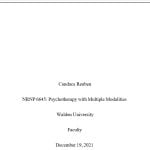Week 3: Foundations of Group Work and Types of Therapy
Group therapies refer to a form of treatment where people sharing a common problem are placed in a group and, through the guidance of a therapist, talk and face their problems to help them change. It helps individuals enhance their social functioning through group experiences and cope more effectively with problems at hand (Ezhumalai et al., 2018). Group therapies are characterized by effective communication, a sense of belonging, and build...
Read More
PRAC 6552: Advanced Nurse Practice in Reproductive Health Care PracticumOverview:Your Practicum experience includes working in a clinical setting that will help you gain the knowledge and skills needed as an advanced practice nurse. In your practicum experience, you will develop a practicum plan that sets forth objectives to frame and guide your practicum experience.As part of your Practicum Experience Plan, you will not only plan for your learning in your practicum experience but al...
Read More
Question: The advanced practice psychiatric nurse encourages a patient with gambling addiction to develop a relapse prevention plan. Which of the following is true about a relapse prevention plan?
Question: Which of the following is consistent with the psychotherapeutic approach used by existential psychotherapists?
Question: According to Dearing, Stuewig, and Tangney (2005), understanding the difference between guilt and shame and its impact on an individual’s motivation is critical t...
Read More
Assignment: Family AssessmentAssessment is as essential to family therapy as it is to individual therapy. Although families often present with one person identified as the “problem,” the assessment process will help you better understand family roles and determine whether the identified problem client is in fact the root of the family’s issues.Photo Credit: Getty ImagesTo prepare:Review this week’s Learning Resources and reflect on the insights they provide on family assessment...
Read More
Details Week 7 Assignment: Comparing Humanistic-Existential Psychotherapy with Other ApproachesPhoto Credit: motortion / Adobe StockUnderstanding the strengths of each type of therapy and which type of therapy is most appropriate for each patient is an essential skill of the psychiatric-mental health nurse practitioner. In this Assignment, you will compare humanistic-existential therapy to another psychotherapeutic approach. You will identify the strengths and challenges of each app...
Read More
Assignment 2: Comprehensive Psychiatric Evaluation Note and Patient Case Presentation Photo Credit: PexelsPsychiatric notes are a way to reflect on your practicum experiences and connect them to the didactic learning you gain from your NRNP courses. Comprehensive psychiatric evaluation notes, such as the ones required in this practicum course, are often used in clinical settings to document patient care.For this Assignment, you will document information about a patient that you exami...
Read More
Details Comprehensive psychiatric evaluations are a way to reflect on your practicum experiences and connect the experiences to the learning you gain from your weekly Learning Resources. Comprehensive notes, such as the ones required in this practicum course, are often used in clinical settings to document patient care.For this Assignment, you will document information about a patient that you examined during the last 2 weeks, using the Comprehensive Psychiatric Evaluation Template prov...
Read More
Details Week 1:History and Theories of Psychopathology The history of the diagnosis of mental disorders is fraught with examples of how cultural norms and prejudices interfere with and warp a diagnosis. The result is that normal behavior and orientations have been pathologized as an illness or disease. An example of this would be the story of Alan Turing, the famous British computer scientist of the 20th century, who was instrumental in inventing modern computers and deciphering Ge...
Read More
Details Explain the biological (genetic and neuroscientific); psychological (behavioral and cognitive processes, emotional, developmental); and social, cultural, and interpersonal factors that influence the development of psychopathology.SOLUTION
Factors That Influence the Development of Psychopathology
Psychopathology is often described as a study of untreatable personality disorder consisting of an apparent absence of empathy and remorse, along with superficial charm, shallow rela...
Read More

